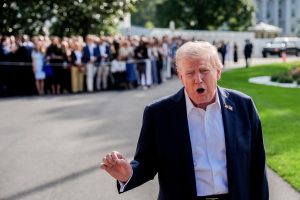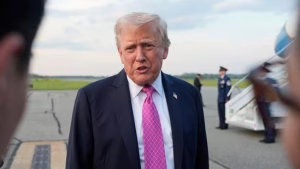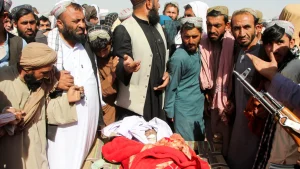Washington D.C. – Amid rising tensions between Islamabad and Kabul, Trump On Pakistan Afghanistan Conflict remarks have drawn significant global attention. The US President, known for his bold assertions on international disputes, said the ongoing border clash would be “an easy one” for him to resolve. His statement came as both nations reported a new wave of ceasefire violations late Friday night.
Trump’s Confidence in Solving the Conflict

Speaking to reporters in Florida, Donald Trump declared that resolving the Trump On Pakistan Afghanistan Conflict would not be difficult for him if he chose to intervene. He referenced his self-claimed record of “solving eight wars,” asserting his diplomatic prowess. Trump said, “Although I do understand that Pakistan attacked, or there is an attack going on with Afghanistan, that’s an easy one for me to solve if I have to solve it.”
His comments came amid heightened border tensions between Pakistan and Afghanistan, where recent airstrikes and retaliatory attacks have reignited hostilities. Observers note that Trump’s timing and tone indicate his renewed interest in global conflict resolution narratives ahead of his domestic political campaigns.
Claims of Solving Multiple Wars

Continuing his speech, Trump reiterated his past claims of mediating global conflicts, including an alleged resolution between India and Pakistan earlier this year. The Trump On Pakistan Afghanistan Conflict narrative aligns with his recurring theme of portraying himself as a peacemaker on the world stage.
Despite his confidence, diplomatic experts have often dismissed his claims, citing the lack of official acknowledgment from involved nations. India, for instance, has repeatedly denied Trump’s assertion of brokering any ceasefire agreement with Pakistan. Nonetheless, Trump’s rhetoric continues to fuel debate over his foreign policy ambitions.
Reference to Nobel Peace Prize
During his remarks, Trump also expressed frustration over not receiving a Nobel Peace Prize, despite “solving so many wars.” He commented, “Somebody got it who is a very nice woman. I don’t know who she is, but she was very generous. I don’t care about that stuff; I just care about saving lives.”
This segment of his speech reflected his familiar tone of self-praise mixed with disdain for global recognition systems. The Trump On Pakistan Afghanistan Conflict remark fit into his broader narrative of global leadership and conflict intervention.
Ceasefire Violation and Border Escalation
The border conflict between Pakistan and Afghanistan has escalated sharply in recent days. Following an intense exchange of fire, both sides had agreed to a 48-hour ceasefire earlier this week. However, Afghan officials claimed that Pakistan violated the truce late Friday night.
According to Afghan authorities, Pakistan launched air strikes in Paktika Province, killing at least ten people. A senior Taliban official confirmed that “Pakistan has broken the ceasefire and bombed three locations,” vowing retaliation. The Trump On Pakistan Afghanistan Conflict debate gained more traction as the attacks coincided with his public remarks.
Civilian and Sports Casualties Reported


Tragically, among those killed in the latest strikes were three local cricketers from Urgun District in Paktika. The Afghanistan Cricket Board confirmed their deaths, describing the attacks as “cowardly.” This revelation has added to the growing condemnation of cross-border aggression.
The Trump On Pakistan Afghanistan Conflict continues to draw emotional and political reactions as the human cost of violence rises. Sports bodies, rights organizations, and international observers have urged both nations to halt further escalation.
Background: The Triggering Incident
The flare-up reportedly began after a blast in Kabul’s Abdul Haq Square last week, during the visit of Taliban minister Amir Khan Muttaqi to India. Afghan officials accused Pakistan of orchestrating the violence, a charge Pakistan has not acknowledged. The Trump On Pakistan Afghanistan Conflict narrative has since evolved as both countries exchange conflicting accounts of aggression.
Earlier reports also suggested that Afghan forces captured 25 Pakistani army posts, allegedly killing 58 soldiers and injuring 30 others. While these figures remain unverified, they illustrate the growing instability along the border.
International Response and Mediation Efforts
Following the escalation, Qatar and other nations called for restraint and renewed dialogue. Both sides extended their ceasefire during talks in Doha, although violations have since continued. Diplomats hope international mediation might ease tensions before the conflict expands further.
As global attention shifts toward the Trump On Pakistan Afghanistan Conflict, analysts suggest that his public remarks could influence diplomatic approaches. His bold declarations, though lacking formal involvement, tend to attract wide media coverage and impact international perception.
Conclusion: Trump’s Bold Rhetoric Amid Real Conflict
While Trump’s claim that the Trump On Pakistan Afghanistan Conflict would be an “easy one” to resolve has stirred debate, the ground realities remain grim. With continued violence, civilian casualties, and fragile ceasefires, the path to peace appears far from simple.
Trump’s confident tone may appeal to his supporters, but for Afghanistan and Pakistan, the challenge is not rhetorical—it is humanitarian. As the world watches, the true test lies not in political statements, but in sustained peace efforts between the two nations.

